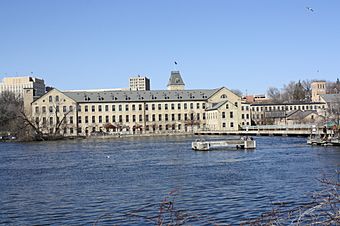Fox River Paper Company Historic District facts for kids
Quick facts for kids |
|
|
Fox River Paper Company Historic District
|
|

The Fox River Paper Company Mills
|
|
| Location | 405-406, 415 S. Olde Oneida St., Appleton, Wisconsin |
|---|---|
| Area | 5 acres (2.0 ha) |
| Built | 1883-1915 |
| Architect | E.D. Jones |
| Architectural style | Romanesque and Italianate |
| NRHP reference No. | 90000639 |
| Added to NRHP | April 19, 1990 |
The Fox River Paper Company Historic District, also known as the Historic Fox River Mills, is a group of old paper mill buildings. They are located in Appleton, Wisconsin, in the United States. These buildings were constructed between 1883 and 1915. Today, they are used as apartments.
Contents
What Are the Historic Fox River Mills?
The Historic Fox River Mills are a collection of buildings that once made paper. They are an important part of American history. These mills show how paper was made a long time ago. The district covers about 5 acres (2 hectares) of land.
A Look Back at Paper Making
Paper mills are factories where paper is produced. The Fox River Paper Company used to make paper here. The buildings were built over many years, from 1883 to 1915. One part, called the Lincoln Mill, actually started as a flour mill. It was later changed to make paper.
Cool Architecture: Romanesque and Italianate
The buildings in the district have different architectural styles. Architecture is the art of designing buildings.
- The Ravine/Rag Mills are built in the Romanesque Revival style. This style often uses strong, rounded arches and thick walls. It looks a bit like old Roman buildings.
- The Lincoln Mill and the Fox River Mill are in the Italianate style. This style often features tall, narrow windows and decorative details under the roof. It was inspired by Italian villas.
Power from the River: Hydroelectricity
Even though the mills are now apartments, they still use water power. There is a special canal and a power station. This system creates electricity from the flowing water. This type of power is called hydroelectricity. The Lower Fox River area has been using water power since the 1880s. This makes it one of the oldest places in the United States to generate electricity this way. It's a great example of how we can use natural resources for energy.



